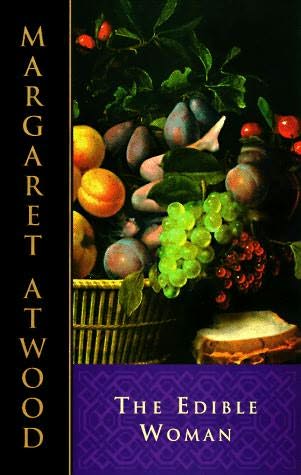
I don't know if I mentioned it before or if it's readily apparent from all the CT posts, but I'm a huge Margaret Atwood fangirl. I started off with reading some of her novels a few years ago, but she's also the first author that incited in me a love of poetry.
She's definitely up high on the list for "authors I love and who have changed my reading perspective." Maybe even #1.
I picked up The Edible Woman at a bookstore this summer. I began reading it--casting aside the other bazillion books I'd splurged on--right away. I remember the way I sat on my bed and sank into this beautiful book.
The Edible Woman--as Atwood's debut, written in the 70s--had a different flavor than the other Atwood books I'd read, like The Handmaid's Tale or The Blind Assassin. There was something inherently different about this book . Something about Atwood's earlier writing style--still assured, yes. Still recognizably Atwood. But somehow less processed.
The Edible Woman tells the story of Marian, a 60's girl with a college diploma who works at job should care less for. She values her independence. Her voice is crisp; her pragmatical nature indisputable. She becomes engaged to Peter: her indisputably practical boyfriend. Things dissolve from there.
There was something of the surreal in this book. Marian gets engaged; things change. Some sort of roadblock forms in her mind as her life as a housewife, married to Peter, solidifies. She can't eat meat anymore. She can't eat much anymore. At one point, she hides under a bed. Her world is shattering; one night, she takes off racing down the streets for no reason at all.
Oh, how I love my crazy main characters.
The surrealism continues: her strange attraction to a graduate student, Duncan, who's frail and a bit like a helpless little boy. Her roommate's, Ainsley, hilarious antics, after a sudden and determined decision to get pregnant, just because. The frailty of her old college friend, Clara, who's weighed down by four squealing kids and who, to Marian, seems little more than someone who gives birth to kids.
There is something otherworldly about the prose and the writing.
Something that still puzzles me: the switch from first person to third person a bit into the book. I guess it could be representative of the way Marian's voice is removed, detached, as she advances further into an stifling engagement she doesn't truly want.
Really, I don't know.
Something I do know: this book is beautiful. It's non-preachy feminism. It's lovely prose-- I think, even though Atwood was so young when she wrote this book (only 24)-- it's as beautiful if not as beautiful as her later books. It's a character study, a relationship study. There's something ethereal to it, almost, as it examines all sorts of different women portrayed in this book. There's something symbolic behind everything, if you'd care to decipher it.
I loved the minor characters a little more than somewhat distant Marian, to tell the truth. Red-headed and eccentric Ainsley, who just wants to use men to further her own ends--she's quite funny. And melancholy Duncan: he seems so real to me that I wouldn't be surprised to see an emaciated figure walking down my street right now. I think he's one of my favorite characters in literature, of all time.
And there is something extraordinary about the minutiae elements in this book: the every day interactions elevated into something truly remarkable. The mundane suddenly something absolutely fascinating. It's like magical realism, but not quite.
Basically, this book just made me love Atwood even more, if that's even possible. And it says a lot that I chose to ramble about The Edible Woman over old favorites such as The Handmaid's Tale or The Blind Assassin. It's my favorite Atwood book.
Some quotes:
"So I'm finally going mad," she thought, "like everybody else. What a nuisance. Though I suppose it will be a change."
"Not liking other people's babies," said Ainsley, "isn't the same as not liking your own."
"After a while I noticed that a large drop of something wet had materialized on the table. I poked it with my finger and smudged it around a little before I realized with horror that it was a tear."
I think this is Atwood at her finest. Really, I'd wear a t-shirt around everywhere with "READ SOME ATWOOD" on the front if I could. Hopefully you'll get a chance to sometime--sooner rather than later :)